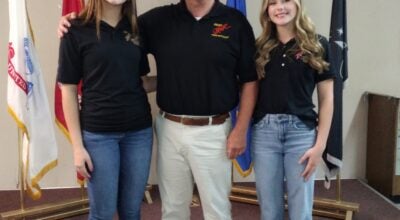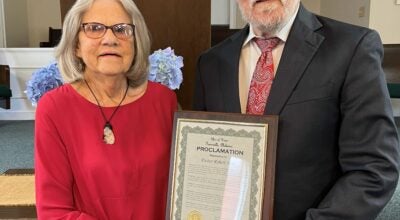Man keeps faith even through severe polio
Published 5:57 pm Monday, August 10, 2009
You are a 10-year-old boy with your whole life ahead of you and the thing you love the most is the smell of a football field in the late hours of the afternoon. To run, to tackle, to catch. To throw a pass and watch it disappear in the setting sunlight for a brief second before it falls into the arms of your receiver. To sweat and crack shoulder pads and helmets together with your buddies. To do the things every little boy is supposed to do.
To hit. And be hit.
One day you get hit pretty hard. One day you don’t get up. You lie there staring up at the sun and your breath leaves you and no matter how hard you try, your muscles refuse to work.
The next day, you are 10-year-old boy who discovers you will not be able to do what you are supposed to do.
You will not run, you will not play, you will not hit.
You will not play football.
Ever.
Again.
Darrell Blackburn has a severe form of polio called Guillain-Barre syndrome. The body’s immune system attacks the nerves causing numbness and paralysis. His first bout with the disease was when he was six-years-old. It lasted only a week, but the episode initially left doctors baffled.
“I got over it, but I could tell something wasn’t right with my body anymore,” said Blackburn.
But in 1978 during the first Pee Wee football game of his life in Georgiana, Darrell said he was sandwiched between two other players. The blow knocked Darrell unconscious and briefly left him paralyzed. He spent four months in the hospital on a ventilation machine with hoses and tubes running into his body.
At one point, Darrell said doctors thought they’d lost him.
“The second round of Guillain-Barre was so hard and tough that I died,” said Darrell. “After a few minutes of working on me, they were about to give up and “boom!” I was back. I had had an out-of-body experience.”
He stayed in a wheelchair, working steadily to regain the use of his leg muscles.
Doctors told Darrell he’d probably never walk again. Then, they told him he’d be back in a wheelchair before he was 40.
Blackburn denied the doctors that satisfaction, but his mother, Bane, said her son’s condition has deteriorated to the point where Darrell has come to rely more and more on the wheelchair. He turns 41 on August 15.
“Sometimes he’s able to use a walker,” she said.
Doctors were shocked Guillain-Barre struck Darrell at such a young age, said Bane. The disease affects just one person per 100,000.
“The doctors could not get over that,” she said. “It never hits a child that young and it’s so rare. It usually happens to people over the age of 65.”
Denied playing football, Darrell turned to coaching his son, Colt, in the YMCA’s youth leagues. But the pain of walking forced Darrell away from the football field six years ago, he said.
He was able to walk his daughter, Donna, across the football field at Tiger Stadium during homecoming in 2006. She was the senior maid. A photograph of the moment shows Donna beaming, arm-in-arm with her father, who stands stoically by her side, one hand in his pocket.
“That’s the last time he’s walked across a football field,” said Bane. “If you look at that picture you can tell that he’s sort of leaning on her.”
“But he was wounded for our transgressions, he was bruised for our iniquities; the chastisement of our peace was upon him; and with his stripes we are healed.”
Isaiah 53:5 in the Old Testament is one of Darrell’s favorite Bible verses. It foretells the sufferings of Christ.
Throughout the trials and tribulations of Darrell’s life, he has always relied on one thing: his faith.
“Knowing He was with me even unto the end of the world,” Darrell said. “One can take comfort when they hold onto the nail-scarred hand. And when I am at the end and think I can’t keep winning these battles, I’m always reminded of this.
Guillane-Barre is his cross to bear, said Darrell.
“He never promised that the cross would not get heavy and the hill would not be hard to climb,” he said. “He never offered victories without fighting, but He said help would always come in time.”
His mother watches her son struggle daily with the disease, still hoping, still praying. Darrell’s lost weight, she said, down almost 70 pounds from what he used to be.
He’s still fighting.
“Bless his heart,” said Bane. “Every year he says ‘I’m going to coach this year.'”





